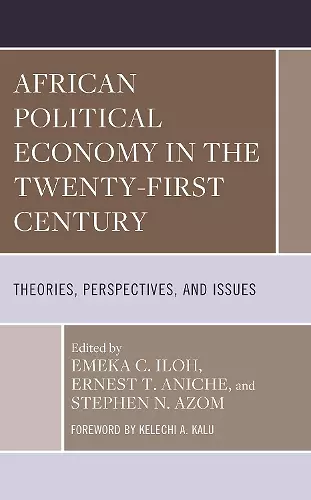African Political Economy in the Twenty-First Century
Theories, Perspectives, and Issues
Emeka C Iloh editor Ernest T Aniche editor Stephen N Azom editor
Format:Hardback
Publisher:Bloomsbury Publishing PLC
Published:12th Sep '23
Currently unavailable, and unfortunately no date known when it will be back

African Political Economy in the Twenty-First Century: Theories, Perspectives, and Issues edited by Emeka C. Iloh, Ernest T. Aniche, and Stephen N. Azom fills the gap in the discourses on African political economy from an African perspective. Since the end of colonialism in the second half of the twenty-first century, a wide-ranging debate has opened on the future of African development and the nature and character of its political economy, especially as it concerns its web of relationships in the international political and economic system. Two decades into the twenty-first21st century, the debate still rages on and is likely to continue for a long time. This book contributes to the debate by addressing the important question of how African countries can strategically and tactically approach global political economy at multilateral, continental, and regional levels in view of North-South versus South-South configurations. African Political Economy in the Twenty-First Century further suggests how African countries can effectively utilize global forces to Africa’s advantage in advancing domestic, regional, and continental development objectives.
This thought-provoking set of essays by 35 African academics, all but four from Nigeria, offers a variety of responses to what they view as “the new scramble for Africa” by outside powers for its vast natural resources. While critical of the economic theories and practices of their former European colonizers, the editors also point out that “[r]unning to China does not ... solve Africa’s problem.” The continent accounts for less than 3 percent of world trade; outside powers constrain efforts toward regional integration, i.e., expanding trade within Africa, to 15 percent. The neo-functional theory designed to explain European integration does not work in Africa, where many of its 54 countries lack sufficient internal integration to engage. Subnational conflicts even prevent efforts to manufacture rather than export their raw materials. Still, some of the authors point to the African Continental Free Trade Agreement, signed in Kigali in 2018, as a potential game changer, gradually integrating them into a sovereign Africa, replete with a single African stock market. Amid a deepening debt crisis in most African states, the authors critically assess international financial flows. Recommended. Advanced undergraduates through faculty. * Choice Reviews *
This book is a major contribution to the study of Africa's political economy. Its interdisciplinary nature and the breadth and depth of its coverage have guaranteed its central place in African studies. -- Kenneth Kalu, Toronto Metropolitan University
A sober consideration of Africa's political economy that prompts the continent to turn the leaf on its aspirations for the socioeconomic and political change that has long eluded it. -- Christopher Changwe Nshimbi, University of Pretoria
ISBN: 9781666930351
Dimensions: 239mm x 158mm x 28mm
Weight: 735g
400 pages